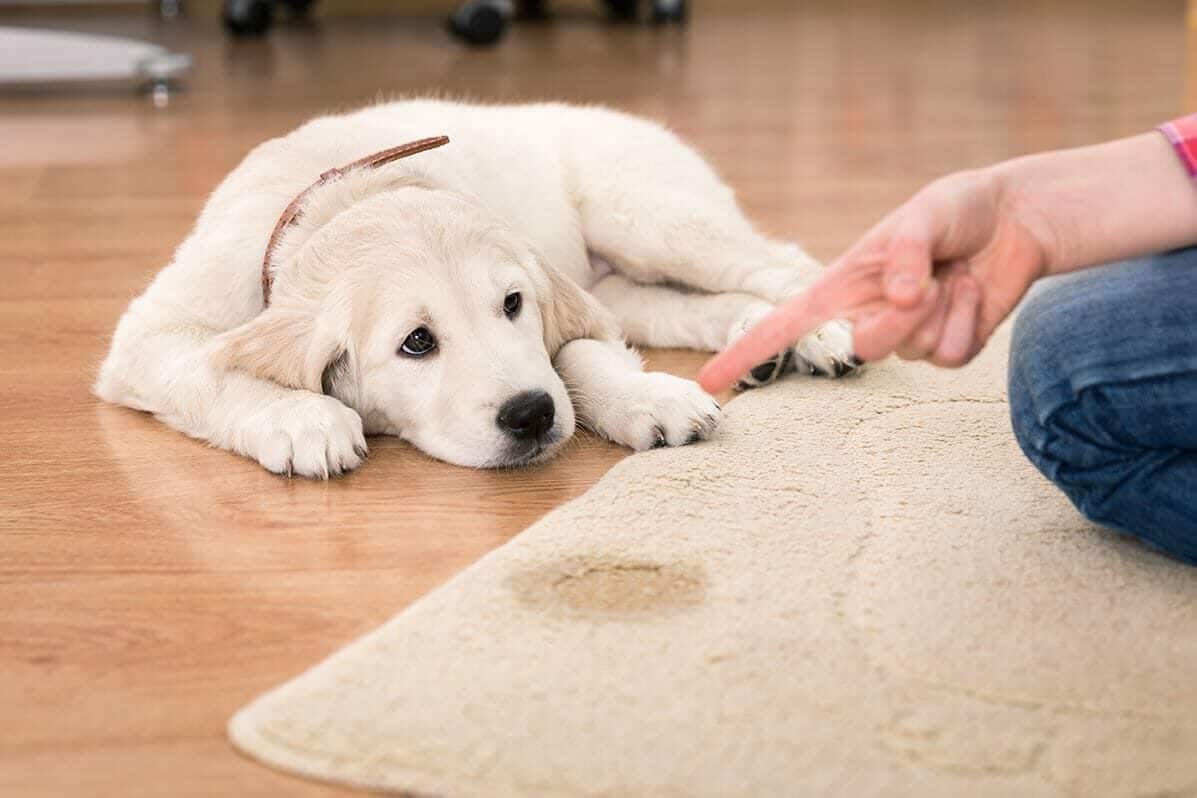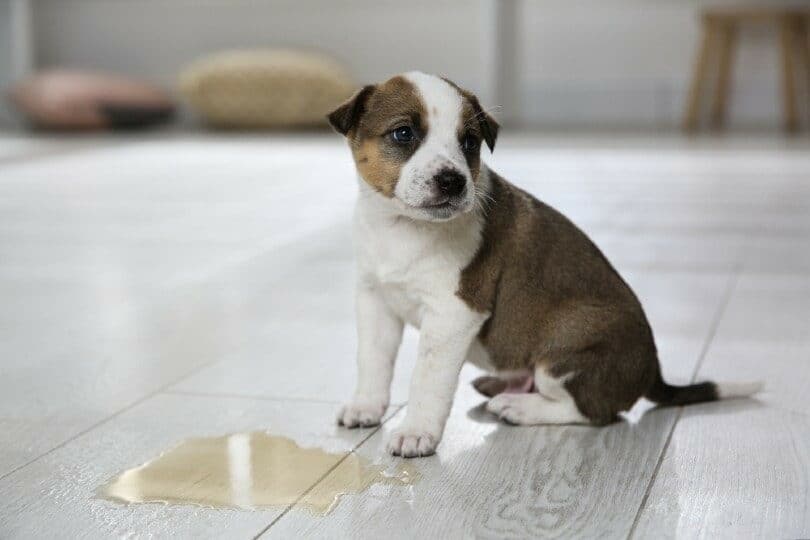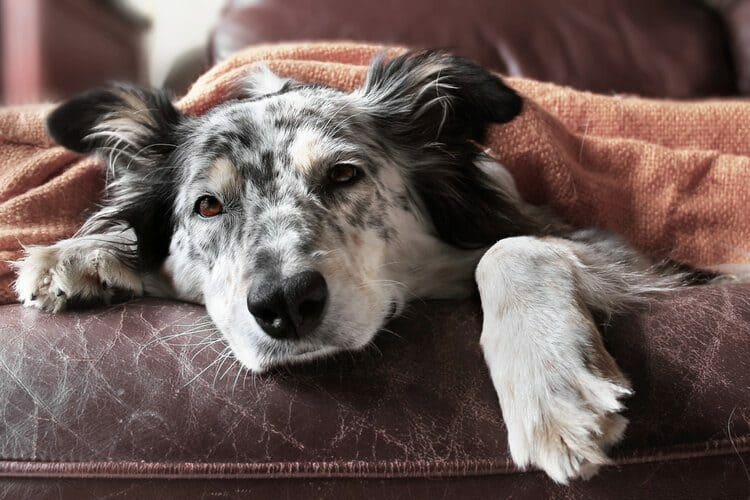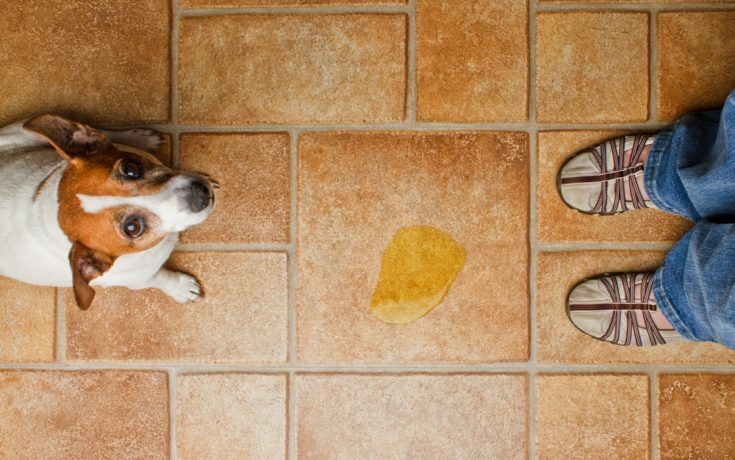Has your previously house-trained dog started peeing inside right in front of you? It can be a little alarming for pet owners to see digression in their pet’s behavior, especially with destructive behaviors like aggression or inappropriate toileting. Your dog may be urinating indoors due to medical or behavioral reasons. It’s essential to determine the reason behind the inappropriate soiling so you and your veterinarian know the best course of action to prevent further mistakes.
Keep reading to find the reasons why your dog could suddenly be peeing in your home.
The 5 Likely Reasons Your Dog Pees in the House in Front of You
1. Submission
Submissive urination is a dog’s way of avoiding confrontation. If your pup has been urinating as a response to fear, they’re displaying signs of submissive urination. You may notice them peeing when someone approaches them directly, talks in a loud voice near them, or reaches towards them. Dogs that urinate out of submission are often anxious, timid, or have had incidents in the past where they’ve been punished for having accidents. More than 70% of dogs display symptoms of anxiety so if this is ringing true for you, you’re certainly not alone.
Since this behavior is fear-based, trying to interrupt it as it’s happening isn’t likely to work. Instead, you will need to determine what your dog is afraid of and work together to build his confidence.

2. Excitement
If your dog is urinating during play or times of excitement and isn’t displaying any body language that suggests fear, they may have issues with excitement urination. You’ll know your pup is displaying signs of this if they’re having accidents during moments of extreme excitement, like when they’re greeting you or when you’re actively playing together.
The good news is that excitement urination is most common in young pups under a year of age and often outgrow it.
3. Territory Marking
Territory marking happens more frequently with intact male dogs or those that have been neutered later in life. It’s a behavior that’s often driven by sex hormones. Occasionally a spayed female will also mark her territory but it’s not as common.
Typically, a dog marking his territory is urinating only in small amounts and most often it’s on upright objects around the home.
You may find your dog marking his territory after certain events take place in his environment.
- Other dogs coming onto the property
- Moving to a new home
- The arrival of new furniture
If marking is a new behavior for your dog, they may be responding to stress or anxiety.

4. Urinary Tract Issues
Sometimes dogs start peeing in the house when they’re having issues with their urinary tract. Urinary tract infections are among the most prevalent causes of inappropriate urination and are fairly common in dogs.
UTIs happen when bacteria travels through your dog’s urethra and enters the bladder. Once in the bladder, the bacteria can grow, reproduce, and cause infections. Some dogs even develop bladder stones at the same time as their UTIs, which then must be removed or dissolved to restore the health of their bladder.
Older female dogs and those with diabetes mellitus are more likely to develop a UTI. Dogs with bladder stones are also more likely to have recurring UTIs.
Your vet might also find that your dog’s bladder is inflamed—a condition known as cystitis. Cystitis can be caused by bladder stones or bladder tumors. Most dogs with this condition will also have urine in their blood.
Thankfully most urinary problems respond well to medications, supplementation, or dietary changes.
5. Other Medical Issues
There may be an indirect medical cause for your dog’s inappropriate urination. If your dog is suffering from a joint problem or losing his eyesight, he might not be able to get around as well to make his way outside in time to eliminate.
Sometimes senior dogs will begin exhibiting behavior outside of the norm due to cognitive decline. If your dog is older and starts urinating indoors, he may be confused about where he is.
You might notice a puddle of urine where your dog is napping. This is known as urinary incontinence and can be caused by many different medical conditions, from UTIs to spinal injuries and even hormonal imbalances.

How Can I Stop My Dog from Urinating In Front of Me?
The methods you use to discourage inappropriate urination will depend entirely on the reason why your dog is exhibiting this behavior in the first place.
Behavioral urination issues like territory marking or submissive and excitement urination require you to do some homework. Examine the situation in your home. Has something new happened in the environment that could be triggering this behavior in your dog? Did you bring home a new pet or baby recently? Has there been a death in the family? Dogs can be very sensitive to environmental changes, and yours could be acting out because of them.
Your dog might be anxious or excited about situations they’re witnessing outdoors, too. Is there a new dog in the neighborhood? Is your area under construction with a lot of loud and disruptive noises?
If you determine that inappropriate urination stems from behavioral reasons, know that you can work through this problem together. Patience is key here. You may need to revisit the training steps that you used when first house training your dog. Identify the triggers that are prompting the indoor peeing and take steps towards eliminating them. If your dog is stress-peeing because of loud noises outside, try playing calming music in the house to drown it out.
If it’s a medical issue that prompts inappropriate urination, you need to visit the doctor. Urinary tract issues can be easy to treat with a round of medication. You will especially want to visit the vet if you’re noticing increases in thirst, frequency of urination, volume of elimination, or a decrease in bladder control. Your vet can provide valuable guidance and make suggestions about what course of action will be best for your dog.
Never hit, yell, or otherwise punish your dog for urinating in your home. This will not teach him a lesson and instead could teach your dog that his owners are unpredictable and unsafe.
How to Clean Up an Accident
Simply soaking up the urine is not enough. It’s important to not only clean up the liquid from the floor but remove all offending scents as well. If there is even the slightest urine odor remaining, your dog may return to that spot to continue his inappropriate urination habit.
An enzymatic cleaner is a must-have for any pet owner. These powerful cleaners use enzymes in their formula to break down stains and smells. A high-quality enzyme cleaner will remove the urine scent rather than just masking it.
Ventilate the room that was urinated in. Use a fan to direct the scent out of an open window. While the fan is doing its job, soak up all of the urine with a cloth. Follow the directions on the enzyme cleaner of your choice. Usually, you will need to saturate the area that was urinated on with the spray and allow it to sit for several minutes. Use a clean cloth to absorb as much of the remaining cleaner as you can.
Final Thoughts
Inappropriate urination from an otherwise house-trained dog can be frustrating and worrisome. The good news is that it’s not always a serious medical problem that’s causing this behavior. Most of the time, it can be remedied with some patience and a little bit of retraining. If you’re concerned about this behavior, we recommend visiting your veterinarian to discuss your treatment options.
Featured Image Credit: MCarper, Shutterstock














